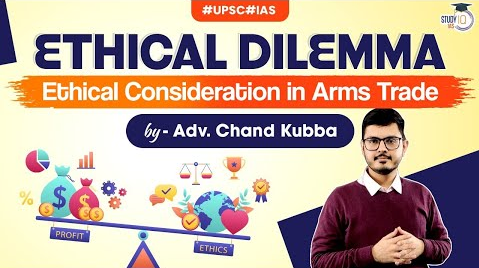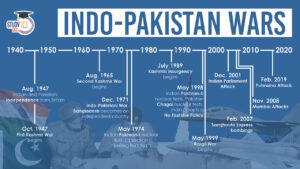Table of Contents
Ethics Case Study Ethical Consideration in Arms Trade
- “The Chairman of Bharat Missiles Ltd (BML) was watching a program on TV wherein the Prime Minister was addressing the nation on the necessity of developing a self-reliant India. He subconsciously nodded in agreement and smiled to himself as he mentally reviewed BML’s journey in the past two decades. BML had admirably progressed from producing first-generation anti-tank guided missiles (ATGMS) to designing and producing state of the art ATGM weapon systems that would be the envy of any army. He sighed in reconciliation with his assumptions that the government would probably not alter the status quo of a ban on the export of military weaponry.
- To his surprise, the very next day he got a telephone call from the Director-General, Ministry of Defence, asking him to discuss the modalities of increasing BML production of ATGMS as there is a possibility of exporting the same to a friendly foreign country. The Director-General wanted the Chairman to discuss the details with his staff at Delhi next week.
- Two days later, at a press conference, the Defence Minister stated that he aims to double the current weapons export levels within five years. This would give an impetus to financing the development and manufacture of indigenous weapons in the country. He also stated that all indigenous arms manufacturing nations have a very good record of the international arms trade.
As Chairman of BML, what are your views on the following points?
- As an arms exporter of a responsible nation like India, what are the ethical issues involved in the arms trade?
- List five ethical factors that would influence the decision to sell arms to foreign governments.
- “भारत मिसाइल लिमिटेड (बीएमएल) के अध्यक्ष टीवी पर एक कार्यक्रम देख रहे थे जिसमें प्रधान मंत्री आत्मनिर्भर भारत के विकास की आवश्यकता पर राष्ट्र को संबोधित कर रहे थे। उन्होंने अवचेतन रूप से सहमति में सिर हिलाया और पिछले दो दशकों में बीएमएल की यात्रा की मानसिक रूप से समीक्षा करते हुए खुद को मुस्कुराया। बीएमएल ने पहली पीढ़ी के एंटी टैंक गाइडेड मिसाइल (एटीजीएमएस) के उत्पादन से लेकर अत्याधुनिक एटीजीएम हथियार प्रणालियों के डिजाइन और उत्पादन तक की प्रगति की थी, जो किसी भी सेना की ईर्ष्या होगी। उन्होंने अपनी इस धारणा के साथ सामंजस्य बिठाया कि सरकार शायद सैन्य हथियारों के निर्यात पर प्रतिबंध की यथास्थिति में बदलाव नहीं करेगी।
- उनके आश्चर्य के लिए, अगले ही दिन उन्हें रक्षा मंत्रालय के महानिदेशक का एक टेलीफोन आया, जिसमें उनसे एटीजीएमएस के बीएमएल उत्पादन को बढ़ाने के तौर-तरीकों पर चर्चा करने के लिए कहा गया क्योंकि एक मित्र विदेशी देश में इसे निर्यात करने की संभावना है। महानिदेशक चाहते थे कि अध्यक्ष अगले सप्ताह दिल्ली में अपने कर्मचारियों के साथ विवरण पर चर्चा करें।
- दो दिन बाद, एक प्रेस कॉन्फ्रेंस में, रक्षा मंत्री ने कहा कि उनका लक्ष्य मौजूदा हथियारों के निर्यात के स्तर को पांच साल के भीतर दोगुना करना है। इससे देश में स्वदेशी हथियारों के विकास और निर्माण के वित्तपोषण को प्रोत्साहन मिलेगा। उन्होंने यह भी कहा कि सभी स्वदेशी हथियार निर्माण करने वाले देशों का अंतरराष्ट्रीय हथियारों के व्यापार का बहुत अच्छा रिकॉर्ड है।
- बीएमएल के अध्यक्ष के रूप में, निम्नलिखित बिंदुओं पर आपके क्या विचार हैं?
- 1 भारत जैसे एक जिम्मेदार राष्ट्र के हथियार निर्यातक के रूप में, हथियारों के व्यापार में कौन से नैतिक मुद्दे शामिल हैं?
- 2 ऐसे पाँच नैतिक कारकों की सूची बनाइए जो विदेशी सरकारों को हथियार बेचने के निर्णय को प्रभावित करेंगे।
- Exporting Arms will be big achievement for India, giving it a push in economic, geo-political and strategic sphere. But at the same time there are some ethical consideration involved in arms trade which need to be taken care of.
- हथियारों का निर्यात करना भारत के लिए बड़ी उपलब्धि होगी, जो इसे आर्थिक, भू-राजनीतिक और रणनीतिक क्षेत्र में बढ़ावा देगा। लेकिन साथ ही हथियारों के व्यापार में कुछ नैतिक विचार भी शामिल हैं जिन पर ध्यान देने की आवश्यकता है।
As an arms exporter of a responsible nation like India, what are the ethical issues involved in the arms trade?
- As an arms exporter of a responsible nation like India, what are the ethical issues involved in the arms trade?
- Violence vs Peace- it is hypocritical to speak of peace while fuelling the arms trade, which only serves the commercial interests of the arms industry and potentially promotes violence.
- Indian Philosophy of Ahimsa vs India’s strategic empowerment and economic growth-
- India always believe in ancient philosophy of ‘Ahimsa Param Dharma’
- Various religions of India also propagate this philosophy.
- On the other hand exporting Arms to other countries will be a big boost to India’s strategic image.
- Economic benefits will also incur.
- Against India’s conventional Position on Disarmament.
- Environment Exploitation.
- हिंसा बनाम शांति- हथियारों के व्यापार को बढ़ावा देते हुए शांति की बात करना पाखंड है, जो केवल हथियार उद्योग के व्यावसायिक हितों की सेवा करता है और संभावित रूप से हिंसा को बढ़ावा देता है।
- अहिंसा बनाम भारत के सामरिक सशक्तिकरण और आर्थिक विकास का भारतीय दर्शन-
- भारत हमेशा ‘अहिंसा परम धर्म’ के प्राचीन दर्शन में विश्वास करता है
- भारत के विभिन्न धर्म भी इस दर्शन का प्रचार करते हैं।
- दूसरी ओर दूसरे देशों को हथियारों का निर्यात भारत की रणनीतिक छवि के लिए एक बड़ा बढ़ावा होगा।
- आर्थिक लाभ भी होगा।
- निरस्त्रीकरण पर भारत की पारंपरिक स्थिति के खिलाफ।
- पर्यावरण शोषण।
List five ethical factors that would influence the decision to sell arms to foreign governments-
- Arms Should not fall in the Hands of Enemy Nation in any way.
- Country procuring the arms should not have a record of Human Rights Violation.
- Arms should not be used by the country on its own people.
- Arms should be used as a tool of deterrence, No First use Policy.
- Along with economic benefit, India should incur geo-political and strategic benefit as well.
- Specifically smaller nations having least security apparatus should be given priority.
विदेशी सरकारों को हथियार बेचने के निर्णय को प्रभावित करने वाले पाँच नैतिक कारकों की सूची बनाइए–
- शत्रु राष्ट्र के हाथ में किसी भी प्रकार से शस्त्र नहीं गिरना चाहिए।
- हथियार खरीदने वाले देश के पास मानवाधिकार उल्लंघन का रिकॉर्ड नहीं होना चाहिए।
- देश को अपने ही लोगों पर हथियारों का इस्तेमाल नहीं करना चाहिए।
- शस्त्रों का उपयोग निरोध के साधन के रूप में किया जाना चाहिए, पहले उपयोग की नीति नहीं।
- भारत को आर्थिक लाभ के साथ-साथ भू-राजनीतिक और सामरिक लाभ भी मिलना चाहिए।
- विशेष रूप से कम सुरक्षा तंत्र वाले छोटे राष्ट्रों को प्राथमिकता दी जानी चाहिए।


 Pakistan-Occupied Kashmir (PoK): History...
Pakistan-Occupied Kashmir (PoK): History...
 List of Indo-Pakistan Wars and Conflicts...
List of Indo-Pakistan Wars and Conflicts...
 Daily Quiz 24 April 2025
Daily Quiz 24 April 2025






















